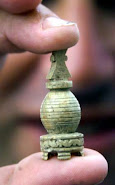Thursday, September 25, 2008
The Goddess Akka
Proto-indo-European word for water: ak(w)-a; important derivatives are island, aquatic, ewer, and sewer. 1. Island-from Old English ig, ieg, island, from Germanic *agwjo. 2. Aqua, Aquarelle, Aquarium, Aquatic, Aqui-, Ewer, Gouache, Sewer, from Latin aqua, water.
From Barbara Walker's "The Woman's Encylopedia of Myths and Secrets."
Akka
Eponymous ancestral Goddess of Akkad, called the Old Woman, the Grandmother, or the Midwife. She was the "Water-drawer" who brought gods to birth out of the primal deep - the feminine prototype of Aquarius. A similar Central-American Goddess figure had curiously similar names, Acat or Akna.(1) [Why curious? If the experts are correct, old world peoples populated the new world, and they would have brought the names of their gods and goddesses with them. The root word for "water" most likely goes back far far beyond proto-Indo-European, back to the time when language was just beginning.]
Akka had many related names. Greeks called her Acco or Acca, "she Who Fashions."(2) To Laps and Finns in northern Europe, she was Mader-Akka -- Mother Akka -- who created humanity.(3) To Romans, she was Acca Larentia, or Acca the mother of the Lares, which were archaic ancestral spirits left over from pre-Roman Latium.
Acca Larentia was variously called the first Vestal Virgin, or a temple prostitute, or a rich courtesan, or a virgin bridge of God -- roles tha may seem mutually contradictory but were not so (see Prostitution; Vestal Virgins). As the divine midwife, she helped Rhea Silvia give birth to Romulus and Remus, founders of Rome. She drew the divine twins out of the floating basket on the river tiber, just as Akka of Akkad drew Sargon out of his floating basket on the river Tigris, and "Pharaoh's daughter" drew Moses from the Nile.
Acca Larentia was honored every year at the roman festival of the Larentalia. She was assimilated to the cult of Heracles, who became one of her husbands. In his Roman temple, Heracles was mated to "Acca, the Maker."(4)
Notes:
(1) Larousse, 439.
(2) Graves, G.M. 2, 190.
(3) Larousse, 306.
(4) Graves, G.M. 2, 190.
Subscribe to:
Post Comments (Atom)



































No comments:
Post a Comment